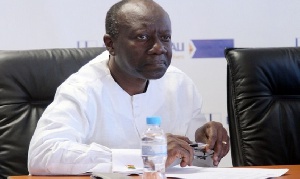 Finance Minister Ken Ofori-Atta
Finance Minister Ken Ofori-Atta
The Finance Committee of Parliament has summoned Finance Minister Ken Ofori-Atta to appear before it on Thursday, July 6 to explain issues concerning the recent 3% VAT introduced by the New Patriotic Party (NPP) government.
The 3% VAT came into effect on July 1, 2017 following the passage of Act 948 to amend the Value Added Tax Act, 2013 (Act 870).
Former Deputy Minister of Finance Cassiel Ato Forson, who has been a critic of the move, wants the tax to be withdrawn.
“All of a sudden the VAT burden, instead of it being reduced, has become an increase. This is because the value-added flat rate only relates to retailers. For some reason, the government decided to include wholesalers,” he said on Wednesday, July 5.
He emphasised: “Globally the practice has been to give only retailers 3 per cent because the input-output turns out to become approximately 2.9 per cent, which is equivalent to 3 per cent”.
He explained: “If you are to extend to wholesalers it is an imposition of an additional tax," as he described "what they [government officials] are doing is a 419 way of imposing taxes on the ordinary Ghanaian”.
Mr Forson believes President Nana Akufo-Addo’s government “tricked Ghanaians into introducing additional tax”.
But Deputy Information Minister Kojo Oppong Nkrumah has refuted such allegations as he argued that the 3% flat rate is another way to arrive at the old Value Added Tax (VAT).
“Traditionally, to arrive at the VAT you needed to calculate 17.5 per cent on the cost of input, 17.5 per cent on your final sales price. You would net off the difference and you would pay the net VAT to government,” he explained.
"The challenge is that a lot of people find it difficult to comply with the paperwork and the computations and so you will find a lot of evasions in the VAT bracket. It is for that reason that not just in Ghana but in many other countries the VAT regime is gradually being moved to a flat rate.”